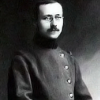Max Stirner

Max Stirner
Johann Kaspar Schmidt, better known as Max Stirner, was a German philosopher. He is often seen as one of the forerunners of nihilism, existentialism, psychoanalytic theory, postmodernism, and anarchism, especially of individualist anarchism. Stirner's main work is The Ego and Its Own, also known as The Ego and His Own. This work was first published in 1845 in Leipzig, and has since appeared in numerous editions and translations...
NationalityGerman
ProfessionPhilosopher
Date of Birth25 October 1806
CountryGermany
Spiritual men have taken into their head something that is to be realized. They have concepts of love, goodness, and the like, which they would like to see realized; therefore they want to set up a kingdom of love on earth, in which no one any longer acts from selfishness, but each one 'from love.' Love is to rule.
Man with the great M is only an ideal, the species only something thought of.
God sinks into dust before man.
Apart from any other basis which might justify a superiority, education, as a power, raised him who possessed it over the weak, who lacked it, and the educated man counted in his circle, however large or small it was, as the mighty, the powerful, the imposing one: for he was an authority.
Only the free and personal man is a good citizen (realist), and even with the lack of particular (scholarly, artistic, etc)culture, a tasteful judge (humanist).
He who is infatuated with Man leaves persons out of account so far as that infatuation extends, and floats in an ideal, sacred interest. Man, you see, is not a person, but an ideal, a spook.
The men of the future will yet fight their way to many a liberty that we do not even miss.
A race of altruists is necessarily a race of slaves. A race of free men is necessarily a race of egoists.
The freedom of man is, in political liberalism, freedom from persons, from personal dominion, from the master; the securing of each individual person against other persons, personal freedom.
From the moment when he catches sight of the light of the world, a man seeks to find out himself and get hold of himself out of its confusion, in which he, with everything else, is tossed about in motley mixture.
Man has not really vanquished Shamanism and its spooks till he possesses the strength to lay aside not only the belief in ghosts or in spirits, but also the belief in the spirit.
Feuerbach ... recognizes ... "even love, in itself the truest, most inward sentiment, becomes an obscure, illusory one through religiousness, since religious love loves man only for God's sake, therefore loves man only apparently, but in truth God only." Is this different with moral love? Does it love the man, this man for this man's sake, or for morality's sake, for Man's sake, and so-for homo homini Deus-for God's sake?
The difficulty in our education up till now lies, for the most part, in the fact that knowledge did not refine itself into will, to application of itself, to pure practice. The realists felt the need and supplied it, though in a most miserable way, by cultivating idea-less and fettered "practical men." Most college students are living examples of this sad turn of events. Trained in the most excellent manner, they go on training; drilled they continue drilling.
The moral man is necessarily narrow in that he knows no other enemy than the immoral man. He who is not moral is immoral! and accordingly reprobate, despicable, etc. Therefore, the moral man can never comprehend the egoist.